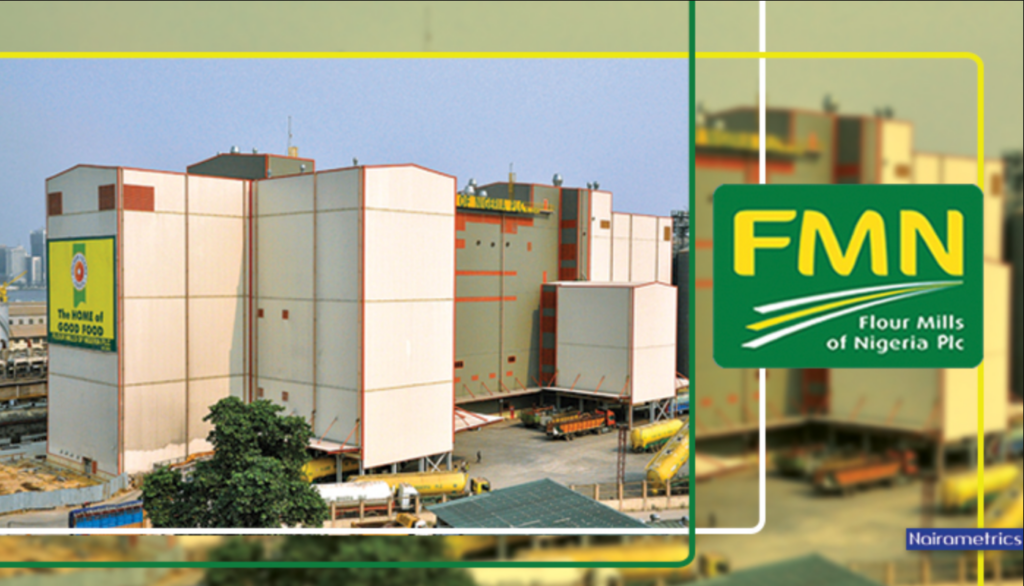Flour Mills of Nigeria has published its audited financial statement for the fiscal year ending March 31, 2024, reporting a profit after tax of N3.54 billion.
This profit represents an 88% decline when compared to the N29.5 billion recorded in the previous fiscal year.
During the fiscal year, the group posted a pre-tax loss of N236.7 million, marking a 101% decline from the N39.8 billion pre-tax profit posted in the 2022/2023 fiscal year.
However, during the year, the group incurred a whopping N2 trillion in expenses on the cost of sales, including N1.84 trillion on raw materials and packaging materials.
The profits recorded by the group during the fiscal year were a result of a deferred tax credit of N3.78 billion enjoyed by the group.
Key Highlights FY 2024 vs FY 2023
- Revenue: N2.29 trillion, +49% YoY
- Cost of sales: N2.02 trillion, +48% YoY
- Gross profit: N272.7 billion, +54% YoY
- Net operating gains: N8.0 billion, -17% YoY
- Selling and distribution expenses: N23.6 billion, +53% YoY
- Operating profit: N208.1 billion, +61% YoY
- Finance costs: N208.8 billion, +139% YoY
- Profit before minimum taxation: N3.95 billion, -91% YoY
- Minimum tax expense: N4.19 billion, +41% YoY
- Loss before income tax: N236.69 million, -101% YoY
- Income tax credit: N3.78 billion
- Profit for the year: N3.54 billion, -88% YoY
- Total Assets: N1.49 trillion, +36% YoY
- Retained earnings: N126.6 billion, -4.5% YoY
Commentary
Flour Mills of Nigeria is the largest revenue-generating consumer goods company in Nigeria, with a revenue of about N2.29 trillion in one year.
The group generated N1.5 trillion from its food segment which deals with the milling of flour products as well as sales of pasta, snacks, and noodles
It also generated N332.9 billion from its agro-allied services which focus on the farming of maize, cassava, soya, sugar cane, and oil palm and the production and sales of fertilizer, edible oils, livestock feeds and poultry products. FMN made N383.9 billion from its sugar segment within the fiscal year.
Speaking on the group’s performance, the Group Managing Director, Boye Olusanya noted, “Our consistent execution and growth underscores FMN’s financial and operational resilience. Despite the challenging economic environment, we have solidified our position as a market leader in the Food and Agro-allied sector, driven by innovative product offerings and efficient operations.”
However, despite its impressive turnover, the group incurred a cost of sales of N2 trillion during the fiscal year, driven by a 50% year-on-year increase in its raw materials cost to N1.84 trillion.
Flour Mills’ gross margins have historically been in single digits, eating up most of its revenues. For the fiscal year, the gross margin was 11.7%, slightly higher than the 11.5% reported a year earlier.
The group posted an operating profit of N208 billion, representing a 61% growth from the N129 billion posted in the previous fiscal year.
During the period, the group’s operating margin also increased to 9.1%, from 8.4% in the previous year.
The group’s impressive operating performance is evidenced by a 62.5% increase in net cash from operating activities, rising to N160.8 billion from N98.9 billion in the previous fiscal year.
The group has controlling interests in Nigerian Eagle Flour Mills Limited, Honeywell Flour Mills Plc, Northern Nigeria Flour Mills Plc, and Premier Feed Mills Company.
During the fiscal year, Nigerian Eagle Flour Mills Limited acquired controlling shares in Port Harcourt Flour Mills, which was previously owned by the Rivers and Bayelsa State Governments.
During the fiscal year, Nigerian Eagle Flour Mills was the group’s most profitable subsidiary, with a net income of N9.1 billion, in contrast with the N10.1 billion net loss posted by Honeywell Flour Mills during the fiscal year.
Premier Feed Mills posted a net income of N1.1 billion, while Northern Nigeria Flour Mills posted a net income of N1.5 billion during the fiscal year.
Honeywell, however, is the largest subsidiary owned by the group, with a total asset of N162.2 billion, followed by Premier Feed Mills Company, the manufacturer of the “TopFeeds” brand, with total assets of N61.8 billion.
